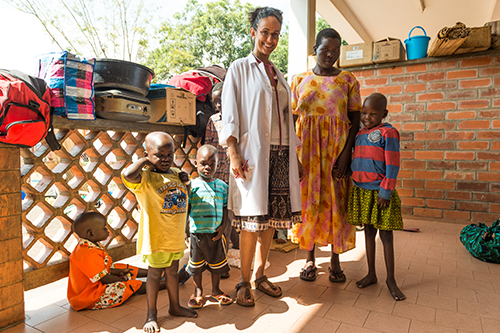The Treatment of Burkitt Lymphoma in Equatorial Africa
Developing a Model of Care for the Treatment of Burkitt Lymphoma (BL) in Equatorial Africa
The scope of the project includes the establishment of hospital networks to improve access to care and earlier diagnosis, the initiation of public and professional education directed towards minimizing delays in reaching a tertiary care center capable of providing therapy for BL, continuing to improve the quality of diagnosis and treatment, and identifying potential approaches to ensuring the sustainability of the overall program – including the cost of care. Late diagnosis is a very important factor in determining outcome, since BL is one of the most rapidly progressive tumors and a high proportion will have progressed to an advanced stage within weeks to months, complicating treatment and reducing the chance of cure. This project is presently on-going in northern Uganda.

Dr Calbi with Children from the Pediatric Burkitt Lymphoma Ward at St Mary’s Hospital, Lacor, Uganda
The major achievements of this project to date include
- Involvement of several NGOs concerned with supporting cancer patients by providing transportation, local accommodation and food for patients and their families.
- Improved community awareness through education of attendees of antenatal clinics and well-child clinics, placement of posters, organized training for community leaders, and utilizing the media.
- Understanding reasons for delays in reaching the hospital from the parents’ perspective such that more effective approaches to overcoming these challenges can be developed.
- Establishment of a population-based cancer registry in northern Uganda.
- Introduction of immunohistochemistry at the center in northern Uganda in order to improve the ability to distinguish between hematological neoplasms and solid tumors and to ensure the validity of its cancer registry data.
- Use of a uniform treatment protocol for BL – more than 800 patients have been treated since 2004.
- Collection of data about presentation features and treatment outcome which has been able to document an excellent survival rate (for Africa) of over 60% at 3 years.
- Introduction of a salvage regimen in the protocol for those who relapse or who fail to respond has proven capable of curing patients with recurrent disease.
- Psychosocial support for patients and their families has been introduced.
- Fund raising involving local NGOs has begun to generate financial support for the care of BL and other pediatric cancers.
For more information about this project, contact info@inctr.be.
